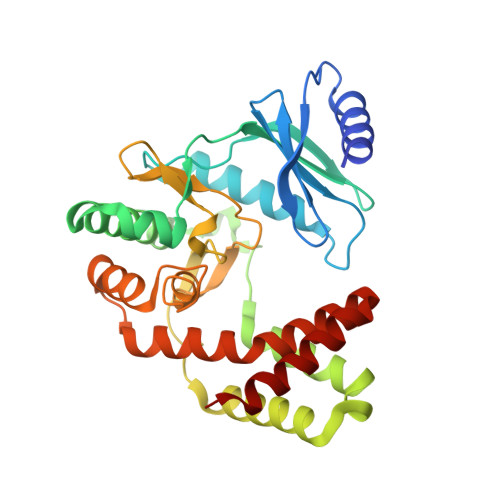Antibiotic Binding Drives Catalytic Activation of Aminoglycoside Kinase APH(2)-Ia.
Caldwell, S.J., Huang, Y., Berghuis, A.M.(2016) Structure 24: 935-945
- PubMed: 27161980
- DOI: https://doi.org/10.1016/j.str.2016.04.002
- Primary Citation of Related Structures:
5BYL, 5IQA, 5IQB, 5IQC, 5IQD, 5IQE, 5IQF, 5IQG, 5IQH, 5IQI - PubMed Abstract:
APH(2″)-Ia is a widely disseminated resistance factor frequently found in clinical isolates of Staphylococcus aureus and pathogenic enterococci, where it is constitutively expressed. APH(2″)-Ia confers high-level resistance to gentamicin and related aminoglycosides through phosphorylation of the antibiotic using guanosine triphosphate (GTP) as phosphate donor. We have determined crystal structures of the APH(2″)-Ia in complex with GTP analogs, guanosine diphosphate, and aminoglycosides. These structures collectively demonstrate that aminoglycoside binding to the GTP-bound kinase drives conformational changes that bring distant regions of the protein into contact. These changes in turn drive a switch of the triphosphate cofactor from an inactive, stabilized conformation to a catalytically competent active conformation. This switch has not been previously reported for antibiotic kinases or for the structurally related eukaryotic protein kinases. This catalytic triphosphate switch presents a means by which the enzyme can curtail wasteful hydrolysis of GTP in the absence of aminoglycosides, providing an evolutionary advantage to this enzyme.
- Department of Biochemistry, McGill University, Montreal, QC H3G 1Y6, Canada; Groupe de Recherche Axé sur la Structure des Protéines, McGill University, Montreal, QC H3G 0B1, Canada.
Organizational Affiliation:



















